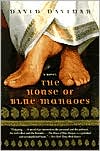

 |

|

The average rating for The House of Blue Mangoes: A Novel based on 2 reviews is 3 stars.
Review # 1 was written on 2018-05-15 00:00:00 Cheri Runyon Cheri RunyonI was taken in by the cover. And guess who went out and bought/planted a mango tree? No, TWO mango trees! Yeah. I am a dangerous reader. This three-generation look at the adventures of a family in India, interlinks with historical facts. It's a purely fictional world, however, but written so skillfully that I searched for place-names in vain. In the village by the sea, Solomon sees life change and the rest of the story follows his sons and grandchildren. The caste system, WWII, India's independence are all weaved into this epic tale and, for the most part, kept me turning the pages. When Daniel encountered it, he was overwhelmed by its qualities ' the pale green skin, the orange-yellow flesh and above all the taste: a distinctive sweetness balanced by a slight tartness. Did I feel the heat, the humidity, the smell from the sea? Could I taste the fictional Chevathar mango, feel the softness of the ripe fruit? In a terrific telling, that's how I get involved in such a book. Alas, I came close but couldn't quite get to the point I wanted to amid the swirling events. The writing is good but I just had no empathy for the characters. I think David Davidar does a much better job describing the physical environment, which kept me pegged to the page. But that extra uplift was missing for me, sigh. Still, a decent epic. And now I will have my own mangoes. Book Season = Summer (golden light) |
Review # 2 was written on 2017-02-02 00:00:00 Chad Nagelkirk Chad Nagelkirk*Minor spoilers ahead* The House of Blue Mangoes is an attempt at writing an epic multi-generational saga, but like most of these stories, it flounders at the end and the family becomes gradually more and more boring. Solomon Dorai is a non-Brahmin Christian, belonging to a caste that appears to be somewhat high on the scale. He is also rich and is the head of the village. Succeeding him are his two sons, Daniel and Aaron, and succeeding them is Kannan. The House of Blue Mangoes is the story of these three generations of men. Make no mistake, this is a book about men. The book is split into three parts, one for each generation. The first one is set in Chevathar, where Solomon rules with an iron hand. He, for me, was an unsympathetic character. His wife, Charity, was the more interesting character, but her feelings were always subsumed into whatever her husband was doing at the moment. In this part, Davidar tackles some of the caste and gender issues and it looked rather promising. But after dying unnecessarily for male pride, the mantle passes on to Daniel. Daniel was interested in education and was despised by his father and brother for not being a warmonger. He and his mother lived with his maternal grandfather after Solomon's death and Daniel came into his own there. He studies medicine and his fame soon spreads far and wide. Then suddenly he decides to return to Chevathar because male name lineage blah blah. The story drifts away at this point as Daniel sets out to bring his entire extended family together. I really failed to see the motivation behind all this effort. Daniel's child, Kannan, was doing fine until he fell in love with the wrong woman. He enters the world of the British and tries to become a brown sahib. There are pages and pages of hunting a tiger, and then HE returns to Chevathar. Pointless. The book might as well be called Dysfunctional Fathers and Submissive Mothers. I did have a problem with the way there was no strong motivation for Daniel and Kannan to return to Chevathar. I don't buy the 'male lineage love in DNA' crap. Daniel was pretty much brought up by his mother and his maternal grandfather, so why not show this loyalty to Nagerkoil, where his mother was from? Wasn't he 50% from there too? As for Kannan, there was no connection with Chevathar for him. What I did enjoy about the book was the detail with which it was written. Whether it was about caste conflict or mangoes or tea or tiger hunting, every single thing was researched in detail and expressed in a very interesting manner. The independence struggle remained in the background, though I would have loved to have seen more of it in the book. The portrait of village life is amazing and is basically what sustained me through this book. Who cares if the story doesn't make sense? Just look at all these descriptions of village roads! The first part is the best. After that, the story just goes downhill. The third part is pretty much pointless. However, I think the book is worth a read because it is a pleasure to read about the daily life in its different facets a hundred years ago. Tamil Nadu comes alive in this book, and not many authors can actually achieve that feat! |
CAN'T FIND WHAT YOU'RE LOOKING FOR? CLICK HERE!!!